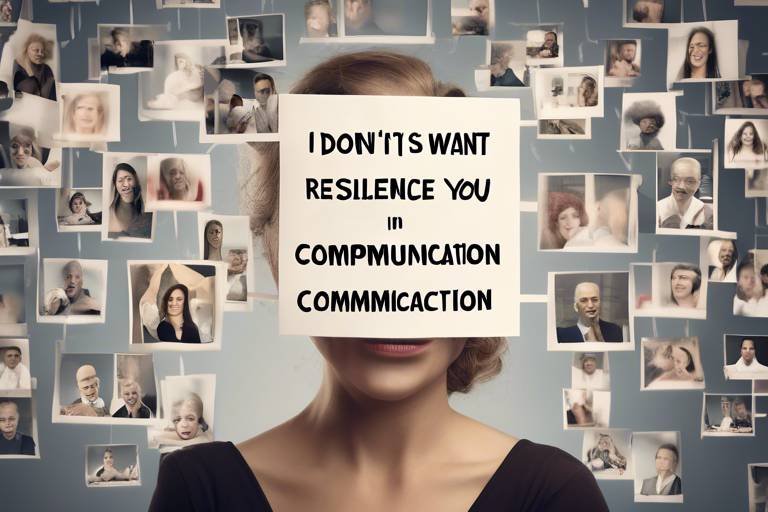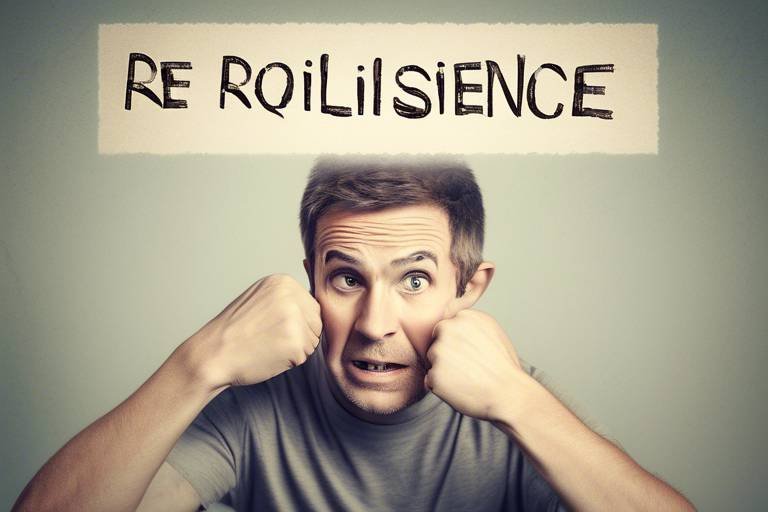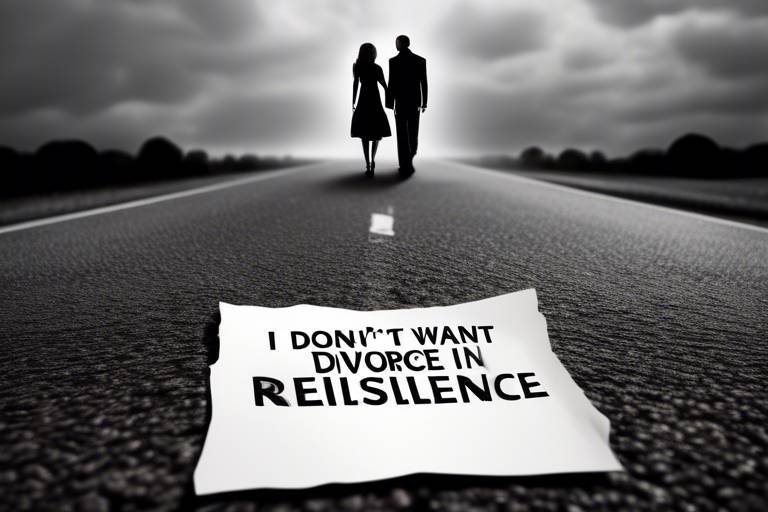Unfolding the Role of Resilience in Personal Development
In today's fast-paced world, the ability to bounce back from setbacks is more crucial than ever. Resilience is not just a buzzword; it's a fundamental quality that can significantly influence our personal growth. Imagine resilience as a rubber band. When stretched, it can return to its original shape, but if it's stretched too far, it may snap. Similarly, our capacity for resilience allows us to navigate life's challenges without losing our essence. This article explores how resilience influences personal growth, the factors that contribute to developing resilience, and practical strategies for cultivating it in everyday life.
So, what exactly is resilience? At its core, resilience is the ability to adapt and recover from adversity, trauma, or stress. It's about maintaining a positive attitude despite life's inevitable ups and downs. Resilience is essential for personal development because it empowers us to face challenges head-on, learn from our experiences, and emerge stronger. Think of it as the mental muscle that helps us withstand life's storms. Without resilience, we may find ourselves overwhelmed by obstacles, unable to move forward.
Delving deeper into the psychological aspects of resilience reveals how our mindset, emotional intelligence, and coping strategies play pivotal roles in our ability to withstand challenges. It's fascinating to consider that our thoughts and feelings can significantly impact our resilience. For instance, those who maintain a positive outlook are more likely to persevere through tough times. Emotional intelligence, the ability to recognize and manage our emotions, also contributes significantly to our resilience. It allows us to navigate stress and adversity more effectively, ultimately leading to personal growth.
A growth mindset fosters resilience by encouraging individuals to view challenges as opportunities for learning. When we adopt a growth mindset, we start to see failures not as roadblocks but as stepping stones toward success. This perspective shift is crucial in personal development, as it allows us to embrace challenges rather than shy away from them. For example, when faced with a difficult task, someone with a growth mindset might think, "This is a chance to learn something new," rather than "I'm going to fail." This positive framing is what fuels resilience.
Understanding the differences between fixed and growth mindsets can illuminate how these perspectives affect resilience. A fixed mindset believes that our abilities are static, while a growth mindset embraces the idea that we can develop our skills through effort and persistence. This distinction is vital because it directly influences how we respond to challenges. Those with a fixed mindset may give up easily when faced with difficulties, while those with a growth mindset are more likely to persist and adapt. The impact of these mindsets on personal growth and adaptability cannot be overstated.
So, how can we cultivate a growth mindset to enhance our resilience? Here are a few practical tips:
- Embrace challenges: Instead of avoiding difficult tasks, tackle them head-on.
- Learn from criticism: Use feedback as a tool for growth rather than a personal attack.
- Celebrate effort: Focus on the hard work you put in, not just the outcome.
By shifting our thinking patterns in these ways, we can enhance our resilience and face challenges more effectively.
Emotional intelligence is vital for resilience. It involves recognizing our emotions and understanding how they influence our behavior. When we can identify our feelings, we can manage them better, especially in stressful situations. For instance, if we feel overwhelmed, acknowledging that emotion allows us to take a step back and reassess the situation. This self-awareness is crucial for coping with stress and adversity, ultimately strengthening our resilience.
Life experiences significantly shape resilience. Overcoming obstacles and learning from failures contribute to personal growth and strengthened resilience. Each challenge we face is an opportunity to build our resilience muscle. Think of it like lifting weights; the more we practice, the stronger we become. Our experiences, whether positive or negative, shape our ability to cope with future challenges.
Setbacks can be powerful teachers. Reflecting on our failures and understanding what went wrong can lead to greater resilience and personal development. Instead of viewing setbacks as failures, we should see them as valuable lessons that inform our future actions. This reflective practice not only helps us grow but also prepares us for similar challenges down the road.
Change is inevitable, and embracing it is key to resilience. Life is full of transitions, and our ability to adapt to these changes can significantly impact our personal growth. Strategies for adapting to change include staying open-minded, seeking support from others, and maintaining a positive outlook. By viewing change as an opportunity for growth rather than a threat, we can harness it as a catalyst for personal development.
- What is resilience? Resilience is the ability to bounce back from adversity and adapt to challenges.
- How can I develop resilience? You can develop resilience by cultivating a growth mindset, enhancing your emotional intelligence, and learning from setbacks.
- Why is resilience important for personal development? Resilience allows us to face challenges, learn from experiences, and ultimately grow as individuals.

Understanding Resilience
Resilience is often described as the ability to bounce back from adversity, but it goes far beyond mere recovery. It’s about adapting well in the face of challenges, trauma, tragedy, and significant sources of stress. Think of resilience as a rubber band; it stretches when pulled but returns to its original shape, often even stronger than before. This ability to recover quickly from difficulties is crucial in our personal development journey.
In our fast-paced and ever-changing world, resilience plays a vital role in how we navigate life's ups and downs. It empowers individuals to face setbacks with a sense of hope and determination. Those who are resilient are not only able to endure hardships but also often emerge from them with newfound strengths and insights. This transformative process is essential for personal growth, as it enables us to learn from our experiences and adapt to future challenges.
So, why is resilience so important? Here are a few key reasons:
- Enhances Coping Skills: Resilient individuals develop effective coping strategies that help them manage stress and adversity.
- Boosts Confidence: Overcoming challenges builds self-esteem and confidence, encouraging further personal development.
- Encourages Adaptability: Resilience fosters flexibility in thinking and behavior, allowing individuals to adapt to change more easily.
- Promotes a Positive Outlook: Resilient people often maintain a hopeful attitude, which can lead to better mental health.
Additionally, resilience is not a fixed trait; it can be developed and strengthened over time. Various factors contribute to building resilience, including social support, a positive self-image, and the ability to regulate emotions. By understanding these components, we can take proactive steps toward enhancing our resilience and, in turn, our personal growth.
In summary, resilience is a fundamental aspect of personal development. It allows us to face life's inevitable challenges with courage and determination, turning obstacles into opportunities for growth. As we delve deeper into the psychology of resilience, we will uncover how mindset and emotional intelligence play crucial roles in shaping our ability to withstand life's storms.

The Psychology of Resilience
Resilience is not just a trait you either have or don’t; it's a complex interplay of various psychological factors that can be cultivated over time. Understanding the psychology behind resilience can empower you to face life's challenges with a more robust approach. At its core, resilience is about how we respond to stress, adversity, and setbacks. It’s like having an internal spring that allows us to bounce back after being pushed down. But what fuels this spring? It’s a combination of mindset, emotional intelligence, and effective coping strategies.
First and foremost, let’s talk about mindset. The way we perceive challenges can dramatically influence our capacity for resilience. A growth mindset—the belief that abilities and intelligence can be developed—encourages us to view challenges as opportunities for growth. On the other hand, a fixed mindset—the belief that our abilities are static—can lead to avoidance of challenges and a higher likelihood of giving up when the going gets tough. This distinction is crucial because it sets the stage for how we react to life’s hurdles.
To illustrate this further, consider the following table that summarizes the key differences between fixed and growth mindsets:
| Aspect | Fixed Mindset | Growth Mindset |
|---|---|---|
| View on Challenges | Avoids challenges | Embraces challenges |
| Response to Setbacks | Gives up easily | Persists through difficulties |
| Effort | Sees effort as fruitless | Sees effort as a path to mastery |
| Feedback | Ignores constructive criticism | Learns from feedback |
Next, emotional intelligence plays a pivotal role in our resilience journey. It involves recognizing, understanding, and managing our emotions as well as empathizing with others. When we can navigate our emotions effectively, we are better equipped to handle stress and adversity. Imagine trying to sail a ship through a storm; without the ability to read the winds and waves (our emotions), we might capsize. Emotional intelligence acts as our compass, guiding us through turbulent times.
Moreover, coping strategies are essential tools in our resilience toolbox. These strategies can be categorized into two main types: problem-focused and emotion-focused coping. Problem-focused coping involves tackling the source of stress directly, while emotion-focused coping aims to manage the emotional fallout. Both approaches have their merits, and often, a combination of the two can be the most effective way to foster resilience. For instance, when faced with a challenging situation, you might first address the problem directly (like seeking solutions) and then engage in activities that help you manage your emotional response (like talking to a friend or practicing mindfulness).
In summary, the psychology of resilience is a multifaceted concept that intertwines mindset, emotional intelligence, and coping strategies. By recognizing how these elements interact, you can cultivate a more resilient self. This understanding not only enhances your ability to bounce back from adversity but also enriches your personal development journey.
- What is resilience? Resilience is the ability to recover from setbacks, adapt well to change, and keep going in the face of adversity.
- Can resilience be learned? Yes, resilience can be developed through various strategies, including fostering a growth mindset and improving emotional intelligence.
- How does emotional intelligence impact resilience? Emotional intelligence helps individuals manage their emotions, which is crucial for coping with stress and challenges effectively.
- What are some effective coping strategies? Effective coping strategies include problem-solving, seeking social support, and practicing mindfulness.
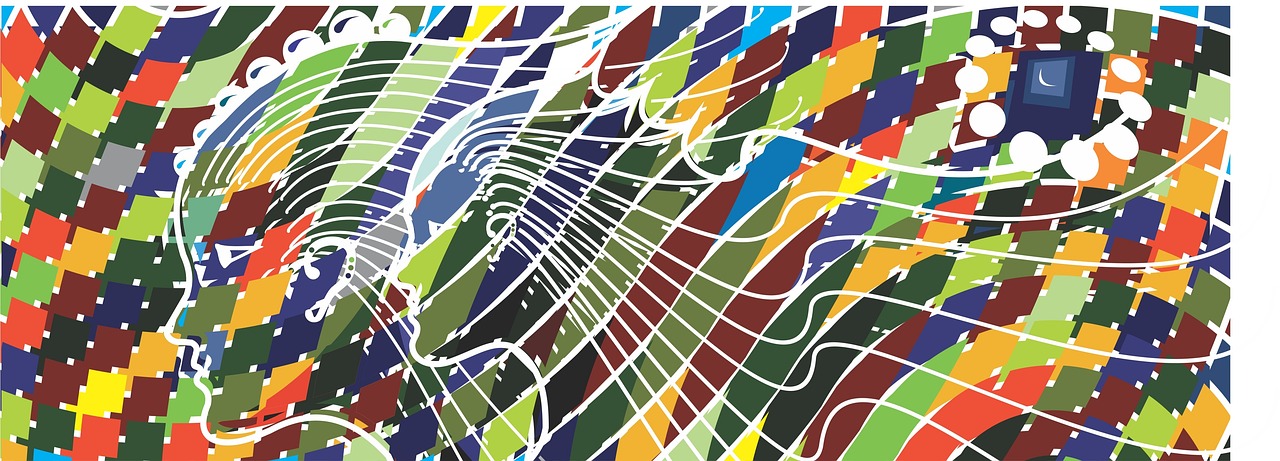
Mindset and Resilience
When we talk about resilience, we can’t overlook the profound impact of mindset. Think of mindset as the lens through which we view the world. It colors our perceptions and influences our reactions to life’s challenges. A growth mindset, which is the belief that abilities and intelligence can be developed, acts like a superpower in the face of adversity. It encourages us to see obstacles not as insurmountable barriers but as opportunities for growth. This perspective fosters resilience, allowing us to bounce back stronger after setbacks.
On the flip side, a fixed mindset can hinder our ability to adapt and recover. Individuals with a fixed mindset believe that their qualities are static and unchangeable, leading them to shy away from challenges. They might think, “I’m just not good at that,” and as a result, they miss out on valuable learning experiences. This can create a vicious cycle where fear of failure prevents them from trying, making it even harder to build resilience. The relationship between mindset and resilience is akin to a tree: a tree with deep roots (a growth mindset) can weather storms, while a shallow-rooted tree (a fixed mindset) may easily topple.
So, how can we cultivate a growth mindset to enhance our resilience? Here are some practical strategies:
- Embrace Challenges: Instead of avoiding difficulties, tackle them head-on. Each challenge is an opportunity to learn and grow.
- Learn from Criticism: View feedback as a tool for improvement rather than a personal attack. Constructive criticism can guide your development.
- Celebrate Effort: Focus on the effort you put in, not just the outcome. Recognizing hard work can motivate you to keep pushing forward.
- Practice Self-Compassion: Be kind to yourself when things don’t go as planned. Understand that everyone experiences setbacks.
By adopting these practices, we can shift our thinking patterns, paving the way for greater resilience. This transformation doesn’t happen overnight; it requires consistent effort and a willingness to step outside our comfort zones. However, the rewards are immense. With a growth mindset, we not only become more resilient but also more adaptable and open to new experiences.
In summary, the interplay between mindset and resilience is crucial for personal development. By nurturing a growth mindset, we empower ourselves to face challenges with confidence, learn from failures, and ultimately thrive in the face of adversity. So, the next time you encounter a hurdle, ask yourself: “What can I learn from this?” This simple shift in perspective can make all the difference.
Q: What is the difference between a fixed mindset and a growth mindset?
A: A fixed mindset believes that abilities are static, while a growth mindset believes that skills and intelligence can be developed through effort and learning.
Q: How can I develop a growth mindset?
A: You can develop a growth mindset by embracing challenges, learning from criticism, celebrating effort, and practicing self-compassion.
Q: Why is resilience important for personal development?
A: Resilience allows individuals to recover from setbacks and challenges, fostering a continuous journey of growth and self-improvement.

Fixed vs. Growth Mindset
When we talk about mindset, it’s like looking at two sides of the same coin: the fixed mindset and the growth mindset. Each of these perspectives shapes how we approach challenges and setbacks in our lives. A fixed mindset is characterized by the belief that our abilities and intelligence are static traits. People with this mindset often shy away from challenges, fearing that failure will expose their limitations. They might think, “I’m just not good at this,” and thus avoid situations that could lead to growth.
On the other hand, a growth mindset embraces the idea that our abilities can be developed through dedication and hard work. Individuals with a growth mindset see challenges as opportunities to learn and grow. They believe that effort leads to mastery, and when faced with adversity, they might say, “This is tough, but I can learn from it.” This fundamental difference in perspective can significantly influence personal development and resilience.
To illustrate the contrast between these two mindsets, consider the following table:
| Aspect | Fixed Mindset | Growth Mindset |
|---|---|---|
| View on Challenges | Avoids challenges | Embraces challenges |
| Response to Failure | Sees failure as a reflection of ability | Views failure as a learning opportunity |
| Effort | Believes effort is futile | Believes effort leads to improvement |
| Feedback | Takes feedback personally | Welcomes feedback for growth |
This table clearly shows how a growth mindset can foster resilience, while a fixed mindset can hinder personal development. By recognizing these differences, individuals can work towards adopting a growth mindset, which ultimately leads to greater adaptability and resilience.
So, how do we move from a fixed to a growth mindset? It starts with self-awareness and a willingness to change our thought patterns. When we catch ourselves thinking negatively or doubting our abilities, we can challenge those thoughts. Instead of saying, “I can’t do this,” we can reframe it to, “I can’t do this yet.” This simple shift in language can open doors to new possibilities and enhance our resilience against life’s challenges.

Developing a Growth Mindset
Developing a growth mindset is not just a buzzword; it's a transformative approach that can change how you navigate life's challenges. Imagine standing at the edge of a vast sea of opportunities, with each wave representing a challenge or setback. Instead of being swept away by the tide of difficulties, a growth mindset allows you to ride those waves, learning to surf rather than sink. But how do you cultivate this mindset? It starts with a few key practices that can shift your perspective and enhance your resilience.
First, it’s essential to embrace the idea that your abilities and intelligence can be developed through effort and perseverance. This mindset shift is crucial because it encourages you to view challenges as stepping stones rather than obstacles. When faced with a difficult situation, ask yourself, “What can I learn from this?” This simple question can open the door to new insights and personal growth.
Another powerful strategy is to surround yourself with growth-oriented individuals. Think about your social circle—are they encouraging and supportive, or do they drag you down? Engaging with people who foster a growth mindset can significantly influence your own outlook. When you hear stories of resilience and perseverance, it ignites a spark within you to adopt similar attitudes. You might even consider joining groups or communities focused on personal development, where sharing experiences and challenges is the norm.
Moreover, it's vital to practice self-compassion. When you fail, instead of being your harshest critic, treat yourself with kindness. Acknowledge that everyone makes mistakes and that failure is a part of the learning process. This perspective not only lessens the sting of setbacks but also encourages you to bounce back stronger. You might find it helpful to keep a journal where you record your thoughts, feelings, and lessons learned from each experience. Reflecting on your journey can reinforce the idea that growth is a continuous process.
Setting realistic goals is another effective method. Break down your larger aspirations into smaller, manageable steps. This way, you can celebrate small wins along the way, which boosts your confidence and keeps you motivated. For instance, if your goal is to improve your public speaking skills, start by practicing in front of a mirror, then progress to speaking in front of friends, and eventually, larger audiences. Each step is a victory that reinforces your growth mindset.
Lastly, don’t forget the power of positive affirmations. These are simple yet powerful statements that can reshape your beliefs. By regularly affirming your ability to learn and grow, you rewire your brain to embrace challenges. For example, telling yourself, “I am capable of overcoming obstacles” can help shift your mindset from one of fear to one of possibility.
In conclusion, developing a growth mindset is a journey that requires intention and practice. By embracing challenges, surrounding yourself with supportive people, practicing self-compassion, setting realistic goals, and using positive affirmations, you can cultivate a mindset that not only enhances your resilience but also propels you toward personal growth. Remember, it’s not about avoiding failure; it’s about learning to dance in the rain.

Emotional Intelligence's Role
Emotional intelligence (EI) is often the unsung hero in the realm of resilience. It’s like the secret sauce that enhances our ability to navigate life's ups and downs. But what exactly is emotional intelligence? In simple terms, it refers to the ability to recognize, understand, and manage our own emotions, as well as the emotions of others. This skill is crucial because it directly influences how we respond to stress, challenges, and interpersonal relationships.
Have you ever found yourself in a heated argument, only to realize later that your emotions got the best of you? That’s where emotional intelligence comes into play. By honing our EI, we can better manage our reactions and maintain a sense of calm amidst chaos. This is particularly important when facing adversity. When we can identify our emotional triggers, we can choose how to respond rather than reacting impulsively. This conscious choice is a hallmark of resilience.
Furthermore, emotional intelligence helps us build stronger relationships, which are essential for support during tough times. Think of it this way: when you’re feeling down, having someone who understands your emotions and can empathize with your situation can make all the difference. This support network not only helps us cope but also encourages us to bounce back and keep moving forward.
To illustrate the impact of emotional intelligence on resilience, consider the following key components of EI:
- Self-awareness: Understanding your emotions and how they affect your thoughts and behavior.
- Self-regulation: The ability to manage your emotions in healthy ways, particularly during stressful situations.
- Motivation: Harnessing your emotions to pursue goals with energy and persistence.
- Empathy: Recognizing and understanding the emotions of others, which fosters better relationships.
- Social skills: Building and maintaining healthy relationships through effective communication and conflict resolution.
These components work together like gears in a machine, driving our ability to adapt and thrive in the face of challenges. For instance, when we experience a setback, self-awareness allows us to acknowledge our feelings of disappointment without letting them overwhelm us. Self-regulation then kicks in, helping us manage those feelings constructively. This process not only aids in recovery but also strengthens our resilience for future challenges.
Moreover, emotional intelligence can be cultivated. Just like physical fitness, it requires practice and dedication. Engaging in activities such as mindfulness meditation, journaling about your emotions, or seeking feedback from trusted friends can enhance your emotional intelligence. As you develop these skills, you’ll find that your resilience grows, allowing you to face life’s hurdles with greater confidence and poise.
In conclusion, emotional intelligence is a powerful ally in the journey of personal development and resilience. By understanding and managing our emotions, we can navigate life's challenges more effectively, build stronger relationships, and ultimately emerge more resilient. So, the next time you find yourself in a tough spot, remember the role of emotional intelligence—it might just be the key to bouncing back!
1. What is emotional intelligence?
Emotional intelligence is the ability to recognize, understand, and manage our own emotions and the emotions of others.
2. How does emotional intelligence affect resilience?
Emotional intelligence helps individuals manage their reactions to stress and adversity, fostering stronger relationships and a greater capacity to cope with challenges.
3. Can emotional intelligence be developed?
Yes, emotional intelligence can be cultivated through practices such as mindfulness, self-reflection, and seeking feedback.
4. What are the key components of emotional intelligence?
The key components include self-awareness, self-regulation, motivation, empathy, and social skills.

Building Resilience Through Experience
Life is a roller coaster, isn't it? One moment you're soaring high, and the next, you're plummeting down. This is where the magic of resilience comes into play. Building resilience through experience is not just about enduring hardships; it's about transforming challenges into stepping stones for personal growth. Every setback you encounter can be a powerful teacher, shaping your character and fortifying your spirit. The experiences we go through, both good and bad, are crucial in developing our ability to bounce back from adversity.
When we face obstacles, it’s easy to feel overwhelmed. However, it’s essential to recognize that overcoming these hurdles can lead to a deeper understanding of ourselves. Think of resilience as a muscle; the more you work it out, the stronger it becomes. Each challenge you navigate adds to your resilience bank, equipping you with the tools needed for future difficulties. So, how exactly do we build resilience through our experiences? Let’s dive deeper into this transformative process.
One of the most significant aspects of building resilience is the ability to learn from setbacks. Setbacks can feel like a dead end, but they often provide the richest lessons. Reflecting on failures can reveal valuable insights about our strengths and weaknesses. For instance, when you face a setback, ask yourself:
- What went wrong?
- What could I have done differently?
- What did I learn from this experience?
By engaging in this reflective process, you can turn a negative experience into a powerful learning opportunity. Adopting this mindset allows you to view challenges not as insurmountable walls but as valuable experiences that contribute to your personal development.
Another crucial factor in building resilience is embracing change. Change is often uncomfortable, but it’s also a necessary part of life. When we learn to embrace change, we open ourselves up to new possibilities and opportunities for growth. Instead of resisting change, try to see it as a chance to reinvent yourself. For example, during times of significant change, consider asking yourself:
- What new opportunities does this change present?
- How can I adapt and grow from this situation?
- What skills can I develop as a result?
By shifting your perspective in this way, you can transform feelings of anxiety into excitement and anticipation. This shift not only helps you adapt to change but also strengthens your resilience by reinforcing your ability to face the unknown.
Incorporating these practices into your daily life can significantly enhance your resilience. Surrounding yourself with supportive people, seeking feedback, and maintaining a positive outlook are all essential components of this journey. Remember, resilience is not a trait you either have or don’t have; it’s a skill that can be developed over time through experience and reflection.
Q: Can anyone become resilient?
A: Absolutely! Resilience is a skill that anyone can develop with practice and the right mindset.
Q: How long does it take to build resilience?
A: Building resilience is a lifelong process. The more challenges you face and learn from, the stronger your resilience will become.
Q: What if I feel overwhelmed by my experiences?
A: It's completely normal to feel overwhelmed. Consider seeking support from friends, family, or a mental health professional to help you navigate tough times.
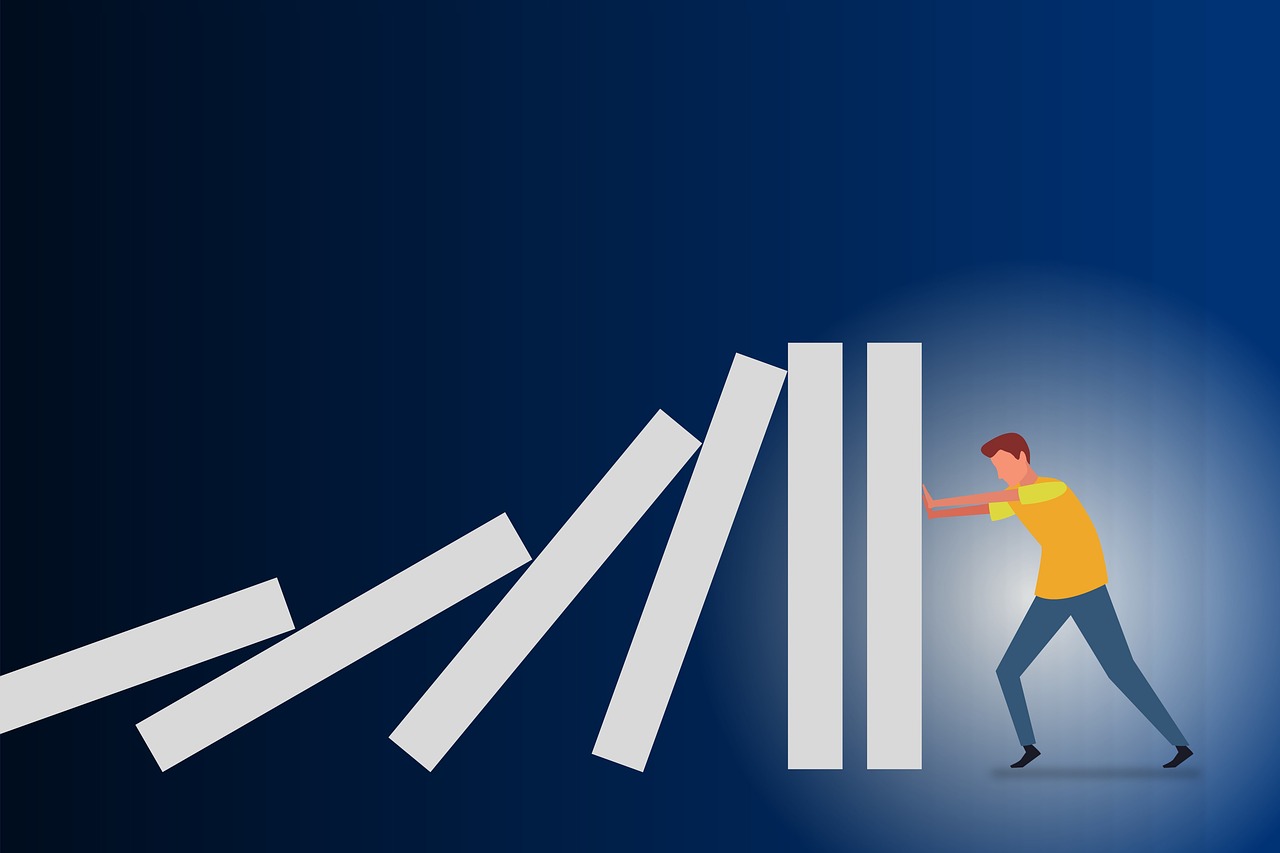
Learning from Setbacks
Setbacks are often viewed as roadblocks on the path to success, but what if we flipped that narrative? Instead of seeing them as failures, we can recognize them as invaluable teachers. Every time we stumble, we have a chance to learn something new about ourselves and the world around us. Think of setbacks as the universe's way of nudging us, saying, "Hey, there’s a lesson here!" Embracing this perspective can transform our approach to challenges and significantly bolster our resilience.
When we encounter difficulties, it’s easy to feel overwhelmed and disheartened. However, if we take a step back and analyze what went wrong, we can extract crucial insights that can guide our future actions. For instance, consider a time when you didn’t get that job you wanted. Instead of wallowing in disappointment, think about what you can learn from the experience. Did you miss any key qualifications? Was your interview technique lacking? By reflecting on these questions, you can turn a setback into a stepping stone toward your next opportunity.
Moreover, setbacks often force us to reassess our goals and motivations. They can act as a catalyst for change, prompting us to pivot in a new direction that may ultimately lead to greater fulfillment. For example, a failed project might inspire you to explore a completely different avenue that aligns more closely with your passions. This process of reevaluation is where true growth happens. Here’s a quick look at how setbacks can enhance personal development:
| Setback | Lesson Learned | Future Action |
|---|---|---|
| Failed exam | Need for better study habits | Develop a structured study plan |
| Job rejection | Improvement needed in interview skills | Practice with mock interviews |
| Business failure | Understanding market needs | Conduct thorough market research |
As we can see from the table, each setback is not just a moment of failure; it’s a rich opportunity for learning and growth. By documenting our experiences and the lessons learned, we can create a roadmap that guides us through future challenges. This proactive approach not only enhances our resilience but also builds a sense of confidence in our ability to navigate life's ups and downs.
In essence, learning from setbacks is about adopting a mindset that values growth over perfection. It’s about recognizing that every misstep is a chance to refine our skills, deepen our understanding, and ultimately emerge stronger. So, the next time you face a setback, ask yourself: What can I learn from this? How can this experience shape my future? By embracing these questions, you’ll be well on your way to cultivating a resilient spirit that thrives on challenges.
- What is the best way to deal with setbacks? Reflect on the experience, identify lessons learned, and adjust your approach for the future.
- Can setbacks lead to positive outcomes? Absolutely! Setbacks can prompt personal growth and lead to new opportunities.
- How can I build resilience? Foster a growth mindset, practice emotional intelligence, and learn from past experiences.

Embracing Change
Change is one of the few constants in life, and embracing it can be the key to unlocking our potential. Think about it: when you were a child, every new experience—whether it was starting school, moving to a new neighborhood, or even trying a new food—was a chance to grow. As adults, we often shy away from change, clinging to the familiar like a security blanket. However, can transform our lives in remarkable ways. It’s like stepping onto a rollercoaster; the initial fear can lead to exhilarating experiences and personal growth.
When we resist change, we often find ourselves stuck in a rut, unable to move forward. But when we learn to accept and adapt to change, we open ourselves up to new opportunities. This shift in perspective is crucial for developing resilience. Here are some practical strategies to help you embrace change:
- Shift Your Mindset: Instead of viewing change as a threat, consider it a chance for growth. Ask yourself, “What can I learn from this situation?”
- Stay Flexible: Life is unpredictable, and being flexible allows you to adjust your plans and expectations. This adaptability is a core component of resilience.
- Seek Support: Don’t hesitate to lean on friends, family, or mentors during times of change. Their perspectives can provide valuable insights.
Moreover, can lead to a deeper understanding of ourselves. Each challenge we face teaches us something new, whether it’s resilience, patience, or even the ability to forgive ourselves for past mistakes. For instance, when you experience a job loss, it can feel devastating. Yet, this moment can also be a catalyst for exploring new career paths or pursuing passions you’ve long ignored. In this way, change, though sometimes uncomfortable, can be a powerful teacher.
As you navigate through life’s inevitable changes, remember that it’s not just about surviving; it’s about thriving. By embracing change, you’re not merely reacting to life’s events; you’re actively participating in your own growth story. This proactive approach makes you more resilient, allowing you to bounce back stronger after each challenge.
In summary, embracing change is essential for personal development. It encourages us to step outside our comfort zones, learn from our experiences, and ultimately, build a stronger, more resilient self. So, the next time change comes knocking at your door, welcome it with open arms. You might just discover a new version of yourself waiting on the other side.
Q: Why is embracing change important for personal development?
A: Embracing change allows us to grow, learn, and adapt, which are essential components of personal development. It helps us to enhance our resilience and face life’s challenges with confidence.
Q: How can I learn to embrace change?
A: Start by changing your mindset about change. View it as an opportunity rather than a threat. Stay flexible, seek support from others, and reflect on what you can learn from each change.
Q: What are some common challenges when embracing change?
A: Common challenges include fear of the unknown, resistance to leaving comfort zones, and anxiety about potential failures. Acknowledging these feelings is the first step to overcoming them.
Frequently Asked Questions
- What is resilience and why is it important?
Resilience is the ability to bounce back from adversity, challenges, and setbacks. It's crucial because it helps individuals navigate life's ups and downs, enabling personal growth and emotional stability. Think of resilience as a rubber band; the more you stretch it, the stronger it becomes!
- How can I develop a growth mindset?
Developing a growth mindset involves embracing challenges and viewing failures as opportunities for learning. Start by reframing negative thoughts into positive ones, focusing on what you can learn from each experience. It's like training a muscle; the more you practice, the stronger your mindset becomes!
- What role does emotional intelligence play in resilience?
Emotional intelligence is key to resilience because it allows you to recognize and manage your emotions effectively. By understanding your feelings and those of others, you can respond to stress and adversity with greater composure and insight, turning potential setbacks into opportunities for growth.
- How can life experiences shape my resilience?
Life experiences, especially overcoming obstacles, significantly contribute to building resilience. Each challenge you face teaches valuable lessons, helping you develop coping strategies and a stronger sense of self. It's like forging steel; the heat and pressure create a stronger, more resilient material.
- What strategies can I use to embrace change?
To embrace change, start by adopting a positive attitude towards it. Practice flexibility by trying new things and stepping out of your comfort zone. Additionally, remind yourself that change often leads to growth, much like a caterpillar transforming into a butterfly!
- How can setbacks contribute to personal development?
Setbacks can be powerful teachers. They force you to reflect on your actions and decisions, helping you identify areas for improvement. By learning from failures, you build resilience and enhance your ability to face future challenges, making you stronger and more adaptable.




